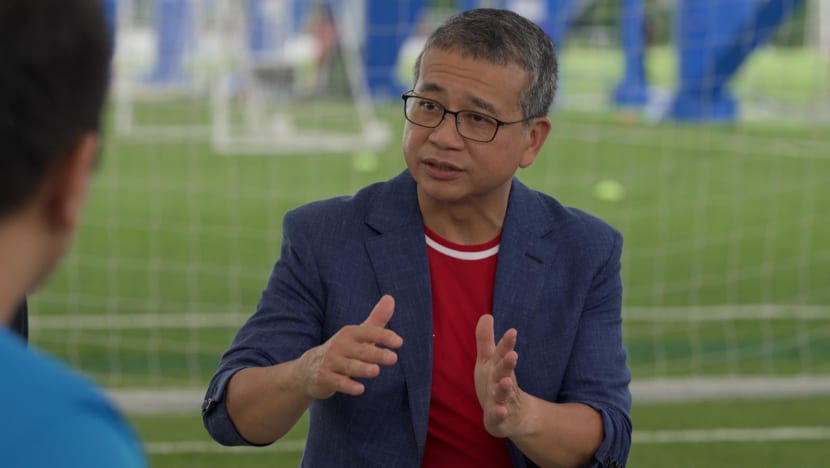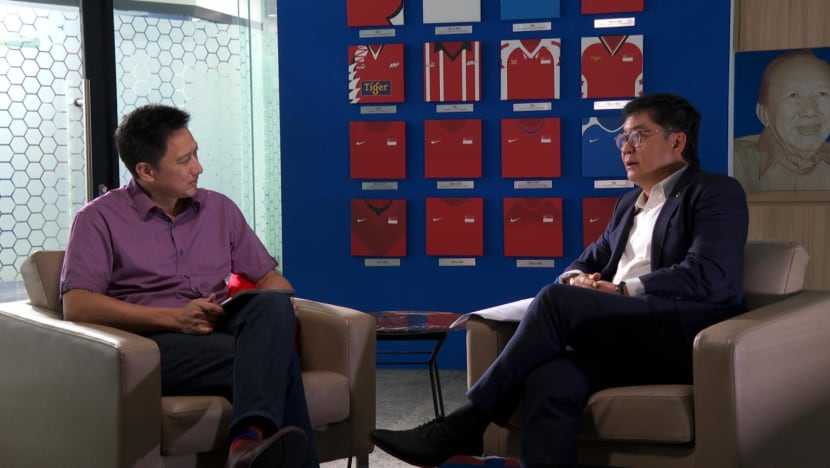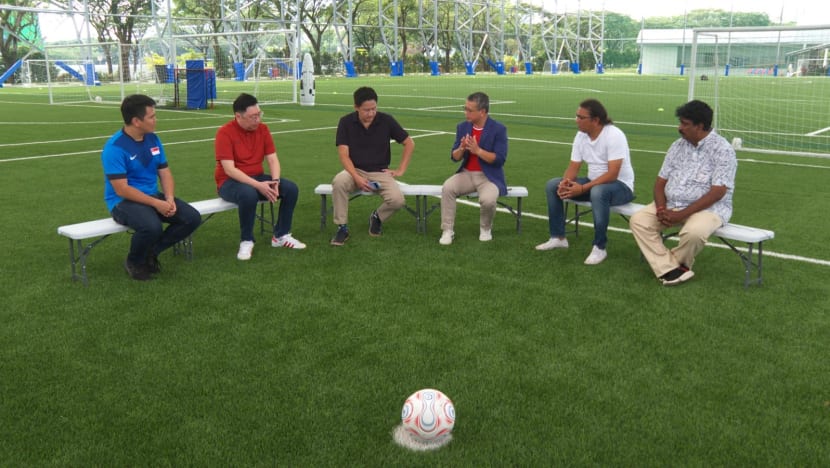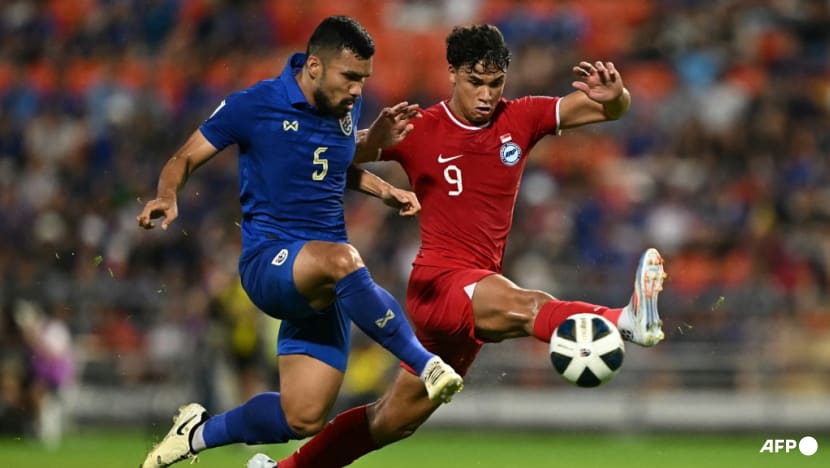Singapore must prioritise growing own football youth pipeline over importing foreign talent: Edwin Tong
The Minister for Culture, Community and Youth tells CNA the "focus is really on building up the Singapore core".

Minister for Culture, Community and Youth Edwin Tong speaking on CNA programme Talking Point.

This audio is generated by an AI tool.
SINGAPORE: The most sustainable way for Singapore football to grow is to build up a pool of its own youth players rather than just importing foreign talent, said Minister for Culture, Community and Youth Edwin Tong.
Speaking on CNA programme Talking Point as part of a panel discussion, he said this approach would also be the most relatable to Singapore.
"Occasionally, we might supplement with a few who’ve been here, who not just as a footballer, but as a person can relate to Singapore and Singaporeans. I think that’s important.
"Because I don’t want a team that is made up of people who wear my jersey, have my flag, but I don’t know them."
Mr Tong cited the example of Indonesia, who recently registered draws against Asian heavyweights Australia and Saudi Arabia in World Cup qualifiers. Both teams competed at the last edition of the World Cup in Qatar.
The vast majority of the team's starting line-up in both matches were of mixed heritage.
They are Indonesian by birth or descent, but may not necessarily be culturally connected to Indonesia in the same way, he said. "I want to build a Singapore team that is Singaporean by culture and Singaporean in identity."
"And if I can bring some foreign players who have that connection ... we will. But our focus is really on building up the Singapore core."
Steven Chia speaks with the top brass responsible for the game, goes behind the scenes at the latest national football project, and heads overseas to learn what it takes to be the world’s best.
Earlier this month, defender Perry Ng from second-tier English club Cardiff City was in Singapore as part of a "familiarisation stint".
Under FIFA rules, he's eligible to play for Singapore via his late paternal grandfather who was born here but later moved to Liverpool. However, under Singapore citizenship rules, one can only qualify for a passport by descent if at least one parent was born in the country or is a citizen by registration.
Also present was Kyoga Nakamura from local outfit BG Tampines Rovers. The Japan-born midfielder arrived in Singapore in 2019 and became a permanent resident earlier this year.
A "PASSION PROJECT"
Mr Tong was speaking with CNA's Steve Chia and other panellists as part of a two-part Talking Point special titled Singapore Football: Can We Make It Great (Again)?

After Thailand, Singapore has won the most ASEAN (AFF) championship titles. But the Lions last lifted the trophy in 2012, and local development of the sport has been in the doldrums for over a decade now.
Mr Tong said that "for a period of time" in the early 2000s, Singapore relied "a lot" on naturalised players in its rise to become a regional powerhouse.
But this masked a deeper problem.
"We did win a couple of AFFs in that period of time. And I think this in some ways ... papered over the cracks," he said.
"The real fundamental problem was we weren’t building a pipeline of young players. And then the moment we stopped having naturalised players, that got exposed."
Speaking separately but on the same Talking Point special, Football Association of Singapore (FAS) president Bernard Tan also said the past had shown that naturalisation alone was not a sustainable strategy, and that the pause in the movement showed up a lack of focus on domestic youth development.
The success that Singapore was having on the field probably masked the urgency to build a youth development system which other countries in the region paid attention to, he added.
"We find ourselves now in a situation where we have to really focus and really build this up," said Mr Tan
To that end, national project Unleash the Roar (UTR) was announced in 2021.
Aimed at raising standards of local football across all levels, the project also hopes to create a structured development system that can fuel the dreams of young players.
Describing UTR as a "passion project" for Singapore, Mr Tong said progress would not happen in a "straight line".
"Which team has not seen a dip? You look at the top international teams, look at the top clubs," he said. "It’s not so much the dip that is the worry per se, it’s how you respond that is critical."

Initiatives under UTR include the establishment of School Football Academies, overseas scholarships and an islandwide Singapore Youth League.
Panelist and former national midfielder Rafi Ali, who now coaches with Singapore Premier League outfit Tanjong Pagar United as well as the ActiveSG Football Academy, hailed the youth focus in particular.
"For the past 10 years, I’ve been talking about youth development ... Finally it’s happening," he said.
Mr R Vengadasalam, current president of youth club Woodlands Lions FC, added it was vital for young players to have a league of their own to compete in and hone their talent.
Woodlands Lions previously had to rely on other tournaments to compete. But they can now play in various tiers of the SYL, he said.
"This SYL project is something which I'm very proud of as our own league."
The league gives kids a platform to play regularly to grow the base; the academies along with National Development Centres help to "marshal" talent into one space; and eventually some of the best are offered the scholarships, said Mr Tong.

"We’ve embarked on measures that we’ve really never done before, all the way through the spectrum of youth - from those who are 7, 8 years old, all the way through to the late teens," said Mr Tong.
"We think that looking after the youth spectrum, building a strong pipeline, having a big base of players is the most sustainable way to rebuild football in Singapore."
As such, it's best to eschew "quick fixes" but "build from the base", he added.
"We want kids who are interested in football, to see a career in football. We want them to realise their aspirations. We want them not to have to choose so much between the academic path and the sporting path.
"If we can get all this right, I think we can be on our way to seeing better results in football in some time. It’s not going to be an overnight project, it won't happen tomorrow but give it some time and I think we will see some results."
Watch Part 1 of this Talking Point special on Thursday (Sep 26), and Part 2 next Thursday (Oct 3). The programme airs on Channel 5 every Thursday at 9.30 p.m.
















